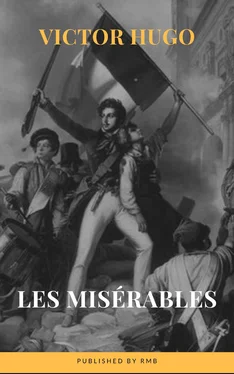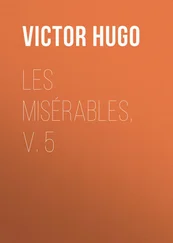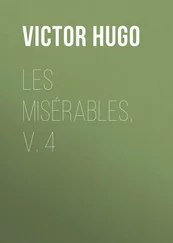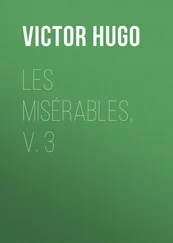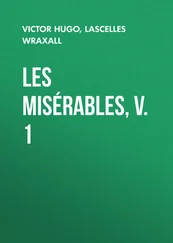He saw nothing of all this. People who are crushed do not look behind them. They know but too well the evil fate which follows them.
Thus he proceeded for some time, walking on without ceasing, traversing at random streets of which he knew nothing, forgetful of his fatigue, as is often the case when a man is sad. All at once he felt the pangs of hunger sharply. Night was drawing near. He glanced about him, to see whether he could not discover some shelter.
The fine hostelry was closed to him; he was seeking some very humble public house, some hovel, however lowly.
Just then a light flashed up at the end of the streets; a pine branch suspended from a cross-beam of iron was outlined against the white sky of the twilight. He proceeded thither.
It proved to be, in fact, a public house. The public house which is in the Rue de Chaffaut.
The wayfarer halted for a moment, and peeped through the window into the interior of the low-studded room of the public house, illuminated by a small lamp on a table and by a large fire on the hearth. Some men were engaged in drinking there. The landlord was warming himself. An iron pot, suspended from a crane, bubbled over the flame.
The entrance to this public house, which is also a sort of an inn, is by two doors. One opens on the street, the other upon a small yard filled with manure. The traveller dare not enter by the street door. He slipped into the yard, halted again, then raised the latch timidly and opened the door.
"Who goes there?" said the master.
"Some one who wants supper and bed."
"Good. We furnish supper and bed here."
He entered. All the men who were drinking turned round. The lamp illuminated him on one side, the firelight on the other. They examined him for some time while he was taking off his knapsack.
The host said to him, "There is the fire. The supper is cooking in the pot. Come and warm yourself, comrade."
He approached and seated himself near the hearth. He stretched out his feet, which were exhausted with fatigue, to the fire; a fine odor was emitted by the pot. All that could be distinguished of his face, beneath his cap, which was well pulled down, assumed a vague appearance of comfort, mingled with that other poignant aspect which habitual suffering bestows.
It was, moreover, a firm, energetic, and melancholy profile. This physiognomy was strangely composed; it began by seeming humble, and ended by seeming severe. The eye shone beneath its lashes like a fire beneath brushwood.
One of the men seated at the table, however, was a fishmonger who, before entering the public house of the Rue de Chaffaut, had been to stable his horse at Labarre's. It chanced that he had that very morning encountered this unprepossessing stranger on the road between Bras d'Asse and—I have forgotten the name. I think it was Escoublon. Now, when he met him, the man, who then seemed already extremely weary, had requested him to take him on his crupper; to which the fishmonger had made no reply except by redoubling his gait. This fishmonger had been a member half an hour previously of the group which surrounded Jacquin Labarre, and had himself related his disagreeable encounter of the morning to the people at the Cross of Colbas. From where he sat he made an imperceptible sign to the tavern-keeper. The tavern-keeper went to him. They exchanged a few words in a low tone. The man had again become absorbed in his reflections.
The tavern-keeper returned to the fireplace, laid his hand abruptly on the shoulder of the man, and said to him:—
"You are going to get out of here."
The stranger turned round and replied gently, "Ah! You know?—"
"Yes."
"I was sent away from the other inn."
"And you are to be turned out of this one."
"Where would you have me go?"
"Elsewhere."
The man took his stick and his knapsack and departed.
As he went out, some children who had followed him from the Cross of Colbas, and who seemed to be lying in wait for him, threw stones at him. He retraced his steps in anger, and threatened them with his stick: the children dispersed like a flock of birds.
He passed before the prison. At the door hung an iron chain attached to a bell. He rang.
The wicket opened.
"Turnkey," said he, removing his cap politely, "will you have the kindness to admit me, and give me a lodging for the night?"
A voice replied:—
"The prison is not an inn. Get yourself arrested, and you will be admitted."
The wicket closed again.
He entered a little street in which there were many gardens. Some of them are enclosed only by hedges, which lends a cheerful aspect to the street. In the midst of these gardens and hedges he caught sight of a small house of a single story, the window of which was lighted up. He peered through the pane as he had done at the public house. Within was a large whitewashed room, with a bed draped in printed cotton stuff, and a cradle in one corner, a few wooden chairs, and a double-barrelled gun hanging on the wall. A table was spread in the centre of the room. A copper lamp illuminated the tablecloth of coarse white linen, the pewter jug shining like silver, and filled with wine, and the brown, smoking soup-tureen. At this table sat a man of about forty, with a merry and open countenance, who was dandling a little child on his knees. Close by a very young woman was nursing another child. The father was laughing, the child was laughing, the mother was smiling.
The stranger paused a moment in revery before this tender and calming spectacle. What was taking place within him? He alone could have told. It is probable that he thought that this joyous house would be hospitable, and that, in a place where he beheld so much happiness, he would find perhaps a little pity.
He tapped on the pane with a very small and feeble knock.
They did not hear him.
He tapped again.
He heard the woman say, "It seems to me, husband, that some one is knocking."
"No," replied the husband.
He tapped a third time.
The husband rose, took the lamp, and went to the door, which he opened.
He was a man of lofty stature, half peasant, half artisan. He wore a huge leather apron, which reached to his left shoulder, and which a hammer, a red handkerchief, a powder-horn, and all sorts of objects which were upheld by the girdle, as in a pocket, caused to bulge out. He carried his head thrown backwards; his shirt, widely opened and turned back, displayed his bull neck, white and bare. He had thick eyelashes, enormous black whiskers, prominent eyes, the lower part of his face like a snout; and besides all this, that air of being on his own ground, which is indescribable.
"Pardon me, sir," said the wayfarer, "Could you, in consideration of payment, give me a plate of soup and a corner of that shed yonder in the garden, in which to sleep? Tell me; can you? For money?"
"Who are you?" demanded the master of the house.
The man replied: "I have just come from Puy-Moisson. I have walked all day long. I have travelled twelve leagues. Can you?— if I pay?"
"I would not refuse," said the peasant, "to lodge any respectable man who would pay me. But why do you not go to the inn?"
"There is no room."
"Bah! Impossible. This is neither a fair nor a market day. Have you been to Labarre?"
"Yes."
"Well?"
The traveller replied with embarrassment: "I do not know. He did not receive me."
"Have you been to What's-his-name's, in the Rue Chaffaut?"
The stranger's embarrassment increased; he stammered, "He did not receive me either."
The peasant's countenance assumed an expression of distrust; he surveyed the newcomer from head to feet, and suddenly exclaimed, with a sort of shudder:—
"Are you the man?—"
He cast a fresh glance upon the stranger, took three steps backwards, placed the lamp on the table, and took his gun down from the wall.
Читать дальше
